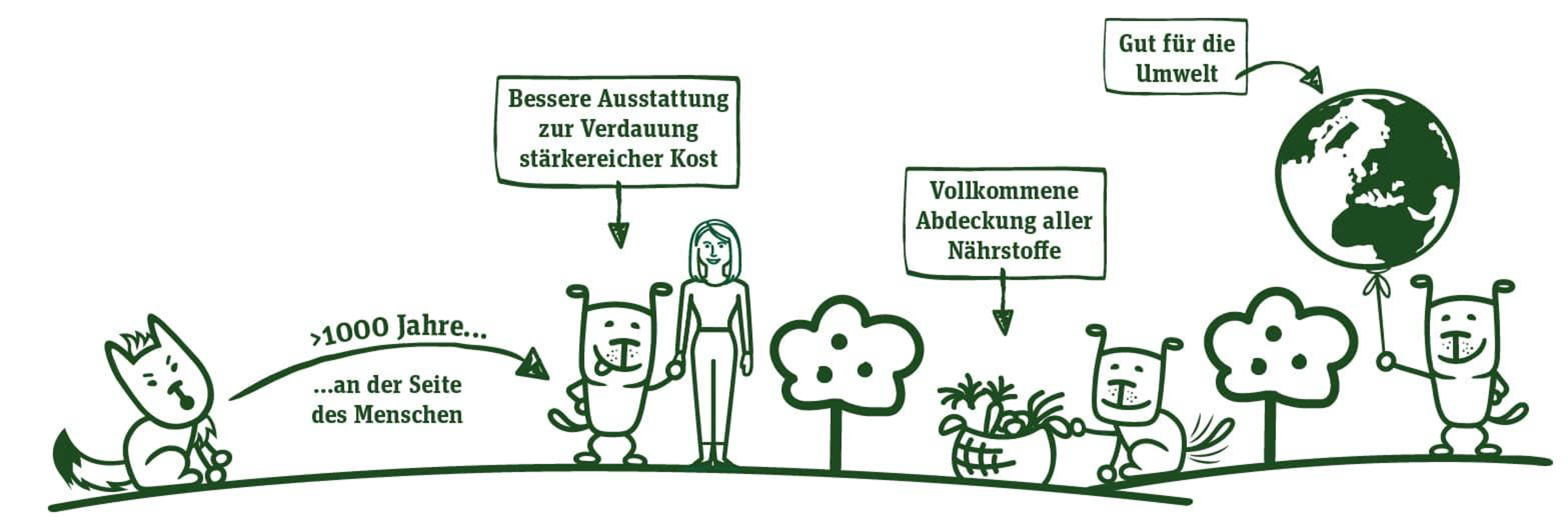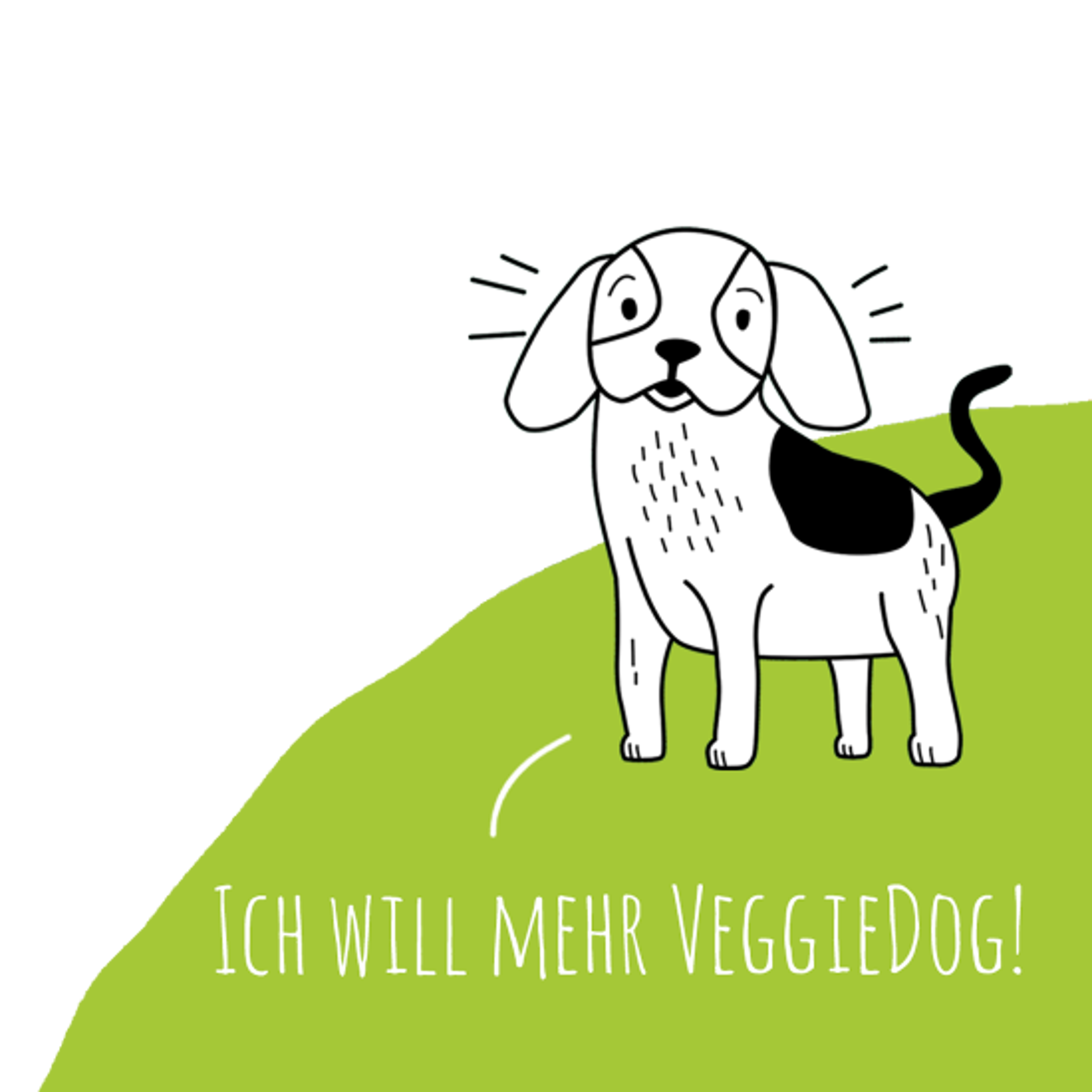Everything you need to know about vegetarian dog food
Dog guides Nutrition
Vegetarian dog food is a good choice for dogs. It provides all the essential nutrients and is an alternative for owners who value the environment and animal welfare. Dogs can live a healthy life with complete vegetarian food. Allergies and intolerances to meat are no longer a problem. As with any change of food, this should be done gradually. If you don't want to switch completely, you can have a veggie day from time to time. An expert should be consulted for puppies, pregnant dogs, senior citizens and sick dogs.
Vegetarian dog food — really? We say yes! For the following article, we worked with our nutritional experts to summarise everything you need to know about this topic.
Click here for vegetarian dog food
Why vegetarian dog food?
People following a vegetarian diet avoid eating meat and fish, while a vegan diet involves completely avoiding all animal products. This lifestyle is more than just a fashion trend as vegetarian and vegan products can now be found in lots of areas.
Many vegetarians and vegans have dogs. This causes something of a moral dilemma. On the one hand, they know that most animal products are far from being sustainable and can be the cause of animal suffering. On the other hand, they still feed meat to their pets. That's why lots of people are now wondering how much meat a dog needs and whether a completely meat-free diet might be possible. And that's exactly the question we intend to answer here!

Meat consumption is a burden for the environment
Issues such as animal welfare, health, food shortages and environmental protection are increasingly topical, with discussions shaped and made more urgent by recent scandals in the food industry. Sustainability is a buzzword that comes up often in relation to meat consumption because the mass production of meat products is affecting the world's climate. The consumption of meat, milk and eggs is responsible for at least 51% of global greenhouse emissions caused by humans.
The high carbon footprint of intensive livestock farming is difficult to reconcile. Conventional livestock farming also has an impact on agricultural land because the amount of land used per unit of protein is lower for plants than it is for animals.
Are you critical of contemporary mass meat consumption? In which case, our dog food is the perfect choice for you and your pet. Perhaps you belong to the increasingly large group of people who are very aware of their diet and health, and may ultimately opt for a vegetarian or vegan lifestyle? If so, our VeggieDog is THE alternative to conventional dog food.

Vegetarian/vegan dog food — how does that work?
To get the right vegetarian or even vegan diet for you or your dog, you need an in-depth understanding of canine or human nutritional requirements.
It is possible to put together interesting homemade food for your dog. However, this is a laborious task that requires knowledge and time.
The key thing is for your dog to get protein, or rather its components the amino acids — and the source does not have to be meat. Meat is not essential in a dog's diet. The crucial feature of dog food is that it should contain all essential nutrients, particularly the vital amino acids. These are absolutely essential and cannot be produced by the body itself.
Our vegetarian dry food for dogs is a complete feed that offers everything a dog needs in a nutritious balanced meal. Often, vegetarian food is simply a supplementary option. Our VeggieDog, by contrast, is a perfectly designed complete feed that requires no additional components. Unfortunately, protein intolerances and meat allergies are widespread among dogs these days. Plant-based proteins offer an excellent and very healthy alternative for sensitive pets.
Lots of dogs who are already being fed vegetarian and vegan food show that animals can be healthy and happy on a balanced, entirely plant-based diet. Science does not support the received wisdom that dogs are pure carnivores like wolves, for whom a vegetarian or vegan diet would not be healthy. However, preconceptions and misinformation of this kind are deeply entrenched. The main argument is still that a meat-free diet is "not species appropriate" or is "unnatural". While it is true that dogs evolved from wolves, a lot has changed over the course of time, and they have adapted to human lifestyles. Unlike wolves, dogs are better equipped with the enzymes required to break down starch in food. But what about protein?
What exactly is protein?
Protein involves long chains of amino acids. During digestion, these proteins are broken down into individual amino acids. Only then can the dog use these substances to build muscles or other body tissue. The essential thing that the dog needs from protein are these little building blocks. Some amino acids are essential for dogs: they must be absorbed from food because the body is not capable of producing them itself.
Whether these specific amino acids come from meat or plant-based protein is irrelevant. The important thing is to ensure an adequate supply. A sophisticated combination of various plant proteins can sometimes even be a better source of essential amino acids than meat. Accordingly, it is absolutely no problem to give your dog a vegetarian diet.
All the other vitamins and minerals that your dog needs from its daily food are included in our VeggieDog vegetarian dog food. By using only plant-based ingredients, the food also has a very pleasant smell and consistency.
VeggieDog is good for dogs
VeggieDog brings a complete feed to our range that is entirely meat free. How is that possible? The most important thing is to ensure your dog gets enough protein, or to be more precise the building blocks known as amino acids. Since dogs cannot create these themselves, it is essential to provide them in food.
The high-quality ingredients in VeggieDog have been assembled with particular care and in consultation with nutritionists following international nutritional guidelines to ensure all your adult dog’s nutritional requirements covered. This means there is no need to feed your dog anything else. VeggieDog is a balanced complete meal:
• Instead of animal protein, our vegetarian dog food contains plant-based proteins: e.g. potatoes, peas and red lentils, which offer an excellent and healthy foundation.
• Valuable fatty acids, biotin, zinc and copper ensure healthy skin and a glossy coat.
• In our gluten-free with Red Lentil taurine and L-carnitine also support your dog's heart health.
• Dogs with food intolerances find VeggieDog to be a palatable alternative as many allergies are caused by conventional meat. Avoiding grains also means the food is well tolerated by dogs. So with Potato & Pea can be a good solution for avoiding potential allergens.
VeggieDog is good for the environment
Our vegetarian dog food is not just good for your dog but also for the environment. In keeping with our motto "Greenify our future", at Green Petfood our mission is to produce all our products in a sustainable manner. Here are a few facts about the sustainability of our dog food:
• Lower CO2 emissions by avoiding meat: consumption of meat, milk and eggs is responsible for at least 51% of the global CO2 emissions caused by humans. What's more, conventional livestock farming has an impact on agricultural land because land use per unit of protein is generally lower for plants than it is for animals. By avoiding meat you are making a contribution to climate protection and reducing your CO2 footprint and pawprint!
• Less animal suffering: it is obvious that by excluding meat from our vegetarian dog food we hope to reduce levels of animal suffering out there. The more dogs that switch to vegetarian food, the fewer animals that will need to be kept in poor conditions for the production of dog food.

Is vegetarian dog food suitable for every dog?
In principle, vegetarian dog food is suitable for any breed. From a nutritional perspective, our VeggieDog product is an ideal complete feed for all adult dogs. The one caveat is for pregnant or nursing dogs and puppies. A vegetarian dog diet is less suitable here due to the significantly higher energy requirements during these phases of life. You should consult an expert in these cases before changing food. The same applies if your dog is suffering from an illness or has other special requirements such as allergies.
Particularly in the case of allergies, our vegetarian dog food VeggieDog can be a wise alternative to conventional dog food because increasing numbers of pets are developing allergies to meat or meat components. The avoidance of grains also ensures excellent acceptance levels. VeggieDog Grainfree is a great option for an exclusion diet to identify potential allergens because it does not contain any animal protein or grains. An exclusion diet should always be implemented in consultation with a vet.
Changing food — what should you know?
Tests have already shown that vegetarian or vegan dog food involving a balanced, plant-based diet has many benefits for dogs. But before you switch to a vegetarian or vegan dog food, you need to consider the following:
The method that is most often practised for implementing a change of food is a step-by-step food change. This involves mixing the new and familiar food. Initially you mix roughly ¼ of the new food with ¾ of the old food. At intervals of 1-2 days, the quantity of new food is increased by ¼, while simultaneously reducing the old food by ¼. Overall, it takes just 5-7 days to transition to the new food.
It is important not to start eagerly feeding your pet a complete helping of the new food from one day to the next because this could cause your dog to suffer e.g. diarrhoea or flatulence. It is better to make the change slowly and gradually to ensure a nice, gentle transition for your dog.

What about a veggie day for your dog?
You do not necessarily have to change your dog's entire diet to do something good for the environment. What about you and your dog scheduling a joint vegetarian day every so often? For one thing, this lets you test whether your dog likes the vegetarian food, and secondly this is a very gentle way to get your dog gradually used to sustainable food. You don't have to switch to a completely vegetarian dog diet. Even just by enjoying the occasional vegetarian day together, you will be taking a big step in a more sustainable direction.

Green Petfood — good for your dog
As a food manufacturer, your pet's well-being is our top priority. With this focus, we deliberately differentiate ourselves from well-known petfood manufacturers and conventional dog food.
This is the reason why VeggieDog contains NO meat. All ingredients are natural in origin, containing no artificial colourings or flavourings, no genetically modified ingredients, no sugar, soya or milk, and needless to say we do not carry out ANY animal testing.
In "conventional" food, you will often find flavour enhancers, sugar and other substandard ingredients. In addition, some manufacturers continue to carry out cruel feeding tests on laboratory animals. It is simply not true to argue that no additional animals die to make pet food due to the use of slaughterhouse waste. Even if bones, cartilage and tendons are often used, increasing numbers of petfood manufacturers are seeking to attract customers with products containing pure lean meat. The fact is, the petfood industry is a billion-dollar business, and the meat industry benefits from this.
Do you want to see whether your dog will eat Green Petfood dog food? To start with, just try a sample of our vegetarian dog food in a 900 g pack.


